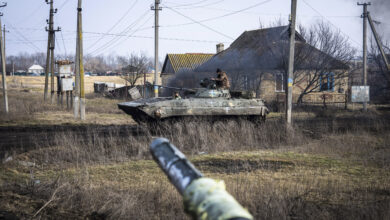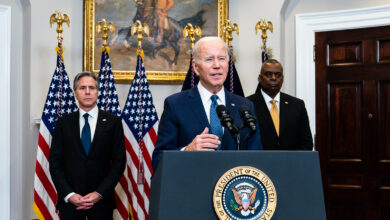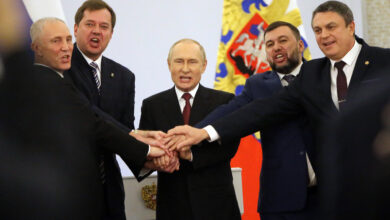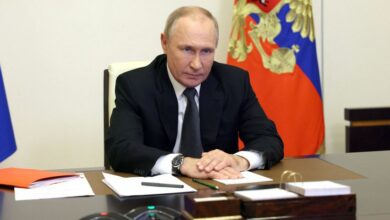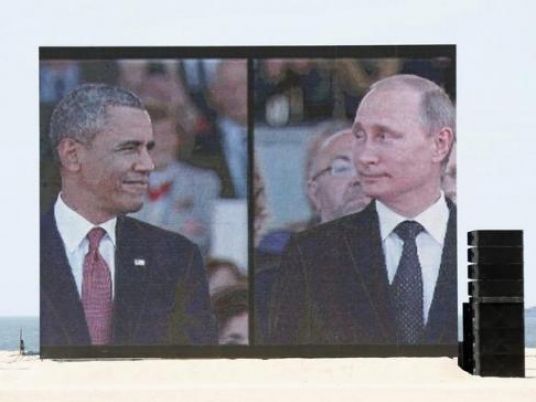
US President Barack Obama accepted an invitation to meet Russian counterpart Vladimir Putin, as a drive to revive efforts to resolve the Syrian conflict kicked into higher gear.
The announcement that Putin and Obama will hold talks at the United Nations in New York on Monday came as the Russian leader insisted supporting Syrian President Bashar al-Assad was the only way to end the country's war.
US Defense Secretary Ashton Carter, meanwhile, said Moscow and Washington could find ways to cooperate in the crisis, amid an apparent shift on Assad's potential role in any deal to end the four-year war that has killed 250,000 people.
Russia, a longstanding Assad ally, has rankled the West by building up its military presence in Syria.
On Thursday, it sparked fresh alarm by announcing it would carry out naval exercises in the eastern Mediterranean this month and in October.
Putin, meanwhile, said in an interview with US broadcaster CBS that Russia's deployment of attack jets, helicopters and armored vehicles to a Syrian air base was designed to save Assad.
"And it's my deep belief that any actions to the contrary — in order to destroy the legitimate government — will create a situation which you can witness now in the other countries of the region or in other regions, for instance in Libya, where all the state institutions are disintegrated," the Russian president said.
– Strained ties –
Syrian officials have said Russia is already helping their fight against Islamic State, which has seized large parts of its territory.
The Syrian military for the first time on Wednesday deployed drones supplied by Russia in its fight against the jihadists, a security source in Damascus said.
Syrian ambassador to Russia Riad Haddad told Interfax news agency that Moscow's assistance would help Syria "finally win against terrorist groups."
The tensions over Syria have further strained ties between Russia and the West which have plunged to Cold War lows over the Ukraine crisis.
However, while the two sides have spent months trading barbs over the Syria conflict, the flood of refugees on Europe's doorstep and the jihadist threat posed by the Islamic State group have given new urgency to ending the chaos.
At the Pentagon, Carter said if Russia were to fight IS jihadists while also pursuing a political solution, and not just "indiscriminately" attack Assad foes, the United States and Moscow might find ways of working together.
"On a course like that, it is possible that we could find areas of cooperation," Carter said.
"But if it's a matter of pouring gasoline on the fire on the civil war in Syria, that is certainly not productive."
Turkish President Recep Tayyip Erdogan, a fierce Assad critic, meanwhile suggested for the first time that the Syrian leader could play a part in a future political transition.
But "nobody envisages a future with Assad in Syria," Erdogan cautioned.
– 'Renewed effort' –
In a sign that European thinking may also be changing, German Chancellor Angela Merkel said "we have to speak with many actors, this includes Assad, but others as well."
European leaders, faced with the worst migrant crisis since World War II, have called for a "renewed UN-led international effort" to end a war that has forced 12 million people from their homes.
The foreign ministers of France, Britain and Germany — as well as EU foreign affairs chief Federica Mogherini — held discussions on Syria in Paris on Thursday.
Germany's Frank-Walter Steinmeier said as he arrived that it was too early to raise the question of whether Assad should be involved in peace talks.
NATO Secretary-General Jens Stoltenberg urged Russia to make its intentions in Syria clear — and said they should assist in US-led strikes on Islamic State extremists.
"The first step now is to sit down with the United States and to make clear what are (Russia's) intentions… and to try to cooperate and give a constructive contribution to the efforts led by the United States to fight ISIL (Islamic State)," he told AFP.
But experts warn that significant obstacles remain to any solution to the brutal Syrian conflict with major players in the West and the Gulf on the one hand, and Russia and Iran on the other, pursuing vastly different military and diplomatic tactics.
Western leaders have long demanded Assad's departure as part of any diplomatic solution, while Russia and Iran want him to stay.

